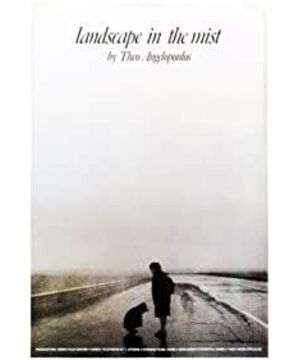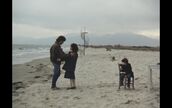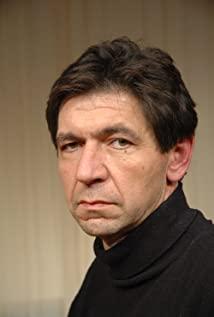In "The Beekeeper" is a journey from north to south in Greece. The beekeeper starts from a city covered with snow in winter and rushes to the south in spring. In "Landscape in the Fog", the journey of the sister and brother to find their father is from south to north, and finally reaches Germany, a beautiful country in fantasy. Two children hug a giant tree tightly.
The script didn't start out that way, with Angelopoulos letting the two kids disappear into the fog. He showed the script to his seven-year-old daughter, who cried and asked, "Where is father? Where is home?".
"Your story is like a fairy tale, and fairy tales have happy endings," the co-writer told Angelopoulos. So he let the two children cross the border and hug the leafy tree—like the first tree created by God in the Bible. "If you want, you can recreate the world. Just like that, with a flick of your hand, the fog will disappear." Angelopoulos said to his daughter. He said that "Landscape in the Fog" was especially made for his daughter - perhaps the artist's casual words, the heaviness of the film's depths is far beyond what a seven-year-old girl can comprehend and carry. One can hope for a happy ending, as shown in the film, but the reality is not so simple.
Angelopoulos' films are often rooted in the profound Greek national culture. In telling allegorical stories, his worried gaze permeates the realistic environment related to the life, situation and future of contemporary Greeks. Most of the people in his films are wandering and chasing. They travel to discover, but the end of discovery is even more desperate, showing internal and external exile. So they kept drifting - "when I come back, it's time to set off again".
Director Leo Angelopulos (Theo Angelopulos), born in Athens on April 27, 1935, studied law at the University of Athens. After watching Godard's "Exhausted", I decided to go to France to study film. He later told Godard about it, and Godard was very happy.
Angelopoulos studied at the famous Film Institute of Higher Education (IDHEC) in Paris. He often visited the Langlore Film Archive in Paris to enjoy his business cards, calling himself "the mouse in the film archive". Soon after, he was expelled for a dispute with a professor. Renowned documentary filmmaker Jean Rouch kept it for the Museum of Anthropology.
Angelopoulos was deeply influenced by Murnau, Mizoguchi Kenji, Antonioni, and Dreyer, and said that after reading Dreyer's "The Promise", "I was excited for three days, as if I was sick, but I was very happy. It's like listening to Vivaldi's double 'Mandolin Concerto' for the first time." He sighed how could there be such a perfect thing in the world.
In "Landscape in the Fog", the siblings are illegitimate children, like naive explorers, who secretly leave home to find their father - in fact, the "father in Germany" is a story made up by the mother to comfort them. They went all the way, met many people, suffered many setbacks and even humiliation, and finally arrived in Germany. There was still fog ahead.
Angelopoulos advocates looking at the world "very carefully", "watching, contemplating, examining" every cue, trying to figure out what's going on. He also makes the audience guess the omitted parts of the narrative through the hints of lines or images, which is reflected a lot in "The Wandering Artist". In "Landscape in the Fog", Mr. Seagull casually said to the two brothers and sisters who were about to travel to find their father: "It's you again, come every night", saying that they have "said it many times". That is, it skillfully explained that the two brothers and sisters have been determined for a long time and avoided repeating the narrative.
Angelopoulos believes that one of the shortcomings of the movie is that it cannot express the inner thoughts of the characters in the play as clearly as in the novel. He looks for a form of externalization, that is, the monologue of the characters. Speaking it through lines will make the content more internalized. . In "Landscape in the Fog", it is expressed as a letter written to her father in the tone of a girl, and in this way, the narrative clues are strung together to describe their journey and their growth process.
The girl Vera wrote to her father, "In a dream, when I came home from school, I felt that you were right behind me." The younger brother Alexander said, "I dreamed about my father last night, and I was a little taller than before" - in the hearts of children, fathers are powerful and can give them strength. As an adult, the uncle cannot use the so-called reality of "a illegitimate child without a father" to erase the sacred dream in the child's heart.
"Finding" is the theme of "Road Movie". In "Brazil Station", the old woman leads the little boy to find his father, and in "Paris in Texas", the father leads his son to find his mother. These journeys with no end are very empty, and the successive disappointments and mixed feelings even make them Blur the original intention. There are so many things that can be distracting on the road. In the ending of "Landscape in the Fog", the father is actually not important anymore, the important thing is the journey itself.
The film contains a clue to Vera's maturity. Vera said goodbye to her mother and ran away from home with her younger brother. This trip was a difficult one. The sister and brother worked tirelessly to keep losing what should not be lost at this age, and getting what should not be gained at this age. "Landscape in the Fog" pays attention to the psychological revealing and scene suggestion in silence, and calmly confesses the rape of Vera by the truck driver. The camera is looking at the back of the truck where the rape took place, panorama, the world around it remains the same, indifferent. Under the distant sky, the sparsely populated roadsides, the barren fields, people's "helplessness" is as terrifying as atrocities. Omission is more thrilling than a living display.
All this may have had devastating consequences for Vera - although she did not sink into a pond in a beautiful pose like Mushaette in Bresson's film. At an overly sensitive and vulnerable age, driven by adults, they face the altar of virginity.
It is likely that this will affect Vera's attitude towards men, and even life, throughout her life. While dancing on the beach with Orestis, the grandson of the touring theatre owner, Vera suddenly ran away and cried. "Something serious must have happened, let her cry," Orestis told Alexander.
Vera could cry against Orestis' chest, but the trauma, the burden on her heart that should not have been taken too early, was a rift in her life that could never be healed. The two brothers and sisters staggered forward. On the broad road to say goodbye, the street lights flickered, and their figures were small. Lots of slow twirling footage, then up, Orestis and his motorcycle stand alone in the middle of the road, saying goodbye to them.
At the station, the young Vera has begun to understand that using beauty to please men in exchange for travel expenses, like a sacrificial lamb, is heartbreaking. The camera only shoots Vera, and we can't see how fiercely the soldier is fighting himself. "What's your name... I'm so stupid." The soldier gave Vera the fare, but he didn't get in trouble. He felt guilty and remorseful for his momentary unkind thoughts. It might be a little bit of color.
Following "Alexander the Great" and "The Journey of the Life of Ulysses", the protagonist of "Landscape in the Fog" is still called "Alexander". Angelopoulos said, "Maybe I take the name 'Alexander' as unisex, as Godard said 'all boys are named Bartke'".
According to one critic, "Angelopoulos' mise-en-scene is often reminiscent of Brecht's clear and almost liturgical lines". Angelopoulos' films are always full of dramatic elements. Especially the alienation inside and outside of "The Wandering Artist". In "Landscape in the Fog", the sister and brother meet the artists who have been wandering since the tour in "The Wandering Artist" in 1975. The protagonist of Angelopoulos' film reappears here. They laboriously rehearse the modern history of Greece. All the important events, but even the theater for the performances could not be rented - the theater was converted into a dance hall. In the end, I had to admit, "Times have changed. Everything will change", and no one cared about their play at all, and "Golf the Shepherd" lost its audience irretrievably.
They "crawl like a snail and don't know where to go". In the surreal scenes of entertainers selling costumes at the seaside, in the midst of the younger brothers and sisters insisting on searching for their life experiences and the wandering entertainers deciding to give up their performances in modern Greece, Angelopoulos symbolically discussed contemporary Greeks. The crisis of loss in national identity. In fact, this is also the problem that every ancient nation that has contributed to human civilization is facing.
Orestis is going to serve in the military and selling his motorcycle. It will all come to an end - "If you compare this to a drama, this is the end".
Angelopoulos has inherited the good habit of thinking of the Greeks, and has been influenced by the obscure French films. His films always have some allegorical aspects that can be interpreted. Although these scenes are exaggerated in reality, they are not lacking in sincerity.
Mr. Seagull fluttered his arms every day, and sometimes he said, "It's going to rain, it's going to get my feathers wet".
The scene of children being caught by the police and people watching the snow was filmed in the small Greek town of Florida, which has a certain charm for Angelopoulos. The snow fell unexpectedly, people shouted "snow", "it's snowing", ran out one after another, stood in the open square and on the side of the road, stared in amazement, reached out to touch, like a group of sculptures.
Another was a nighttime town square where a horse was tortured to death. Facing the dying horse lying on the ground, the boy Alexander couldn't help crying. Watching a life pass away makes the child realize the cruelty and cruelty of life prematurely. Angelopoulos said, "God has given man his own death, and each death has its inevitability, its rhythm, its feeling".
Alexander learned to go to restaurants to clean tables by himself to earn money to buy sandwiches for his sister. In the lonely small restaurant, the old man who played the violin was treated coldly by the owner, but the little boy couldn't help applauding for the excellent sound of the violin. Only the mind of a child can always hear the purest music in the midst of turbulence.
Angelopoulos likes the small northern city of Florida, because of its climate, geographical conditions and urban planning, as well as emotional factors. He said it may be the only city in northern Greece that has not been destroyed and still retains its original character.
In that small town, another woman in a trance in a wedding dress ran out, was dragged back to the wedding, and then a group of people sang and danced.
These surreal scenes depend on the director's attitude. Angelopoulos once said, "Realism? Me? I have nothing to do with it. This religious attitude to reality has never affected me."
On the surreal seaside, lost entertainers have breakfast, shave, and recite their lines, like the lines from "Secret Love in the Peach Blossom Land". Orestis said they themselves "have a hard job of making people laugh and make people cry." In fact, everyone is playing a role, making people laugh and make people cry.
Orestis and Vera saw a huge stone hand being raised from the sea, like the hand of God. This refers to the abrupt segment of the film itself, which traps the characters and the audience in the film, these small people, in a huge and inexplicable moving. Angelopoulos said, "The Greeks grew up touching and kissing those dead stones. I have always tried to bring those myths down from the highest position to represent the people..." And this scene is inevitable With a solemn mythological color.
Angelopoulos lets us see it all through a fixed gaze. The flag-lowering ceremony that Alexander saw in this bleak and troubled country also became a curious repetition.
"Landscape in the Fog" lives up to its name. The boundless wilderness, the expanding power plant, the huge road construction machine, the empty roadside restaurants, a series of unnamed railway stations... Angelopoulos does not put the camera too close to the characters, he is good at expressing the characters and the characters in the landscape. The spatial relationship between people and scenery. In his early films, characters often appeared in groups and disappeared into the landscape around them—earth, sky, ocean.
At the beginning of "Landscape in the Fog", the sister and brother conspired to run away in the bedroom, and dialogue appeared in the completely black picture. In the film, most of the time, the fog is filled with fog, using backlight, silhouette, horizon, and the mood is full of hazy. The monster-like machines and buildings contrasted with the tiny figures of children, implying a great sense of powerlessness.
In the small towns he passed by, Alexander stepped on fallen leaves, an old woman holding a black umbrella, and a soldier lowering the flag in the square. The style of northern Greece, bleak and sad poetry.
At the end of the German moment, the picture is bright and blurry, a giant tree, a wilderness, two pure and dynamic lives. The composition of the giant tree embraced by the siblings is reminiscent of Rousseau's The Oak. Abbas' "Where Is My Friend's Home" and the German film "Bad Girl" also appeared in such giant trees, with similar compositions.
"Angelopoulos is proficient in long takes, especially those of 'people in landscapes' ('landscapes' include streets, interiors, and large areas)". American Raymond Dunart said so. "The Wandering Entertainer" is four hours long and has only eighty takes—one every three minutes on average. Angelopoulos uses the gentle movement and scheduling design between the camera and the characters he has placed his feelings on, emphasizing the characters' silence and secret thoughts, and the amount of information contained in each long shot even exceeds the result of the sum of several short shots. .
Angelopoulos' long shot is mostly empty, which is similar to Chinese landscape painting. The long shot is with the continuous world, which, although it may not be real (perhaps fantasy, dreams, etc.), is a world that is visually represented in its entirety and relative consistency. These long shots are sentimental and poetic, overflowing with austere aesthetics and free spirit, both from Greece and beyond. Angelopoulos said, "As a Greek, I belong to a part of Greek cinema, but not a part of locality or intolerance. When it comes to stylistic issues, there is no intersection...
" Rich, seaside rock, restaurant violin, melancholy concerto. The music with and without sound source is desolate and euphemistic, but it is quiet and restrained.
The foggy landscape that draws the children to run may be on a piece of film picked up on the way. The reality is so unbearable; the past is a betrayal of mythology; the future is likely to be a fateful mystery. The director allows us to see children far from their fathers, a country farther and farther from tradition, a paralyzed love, the powerlessness of art, the fog of death...
American film critic Michael Wilmington says Angelopoulos "Odyssey" '-style road movie, and the movie's "desolate landscape under the bleak sun of winter" is reminiscent of Antonioni and Wim Wenders in the 1960s. Angelopoulos' films show unique purity and power, presenting worlds that are both realistic and surreal.
View more about Landscape in the Mist reviews









